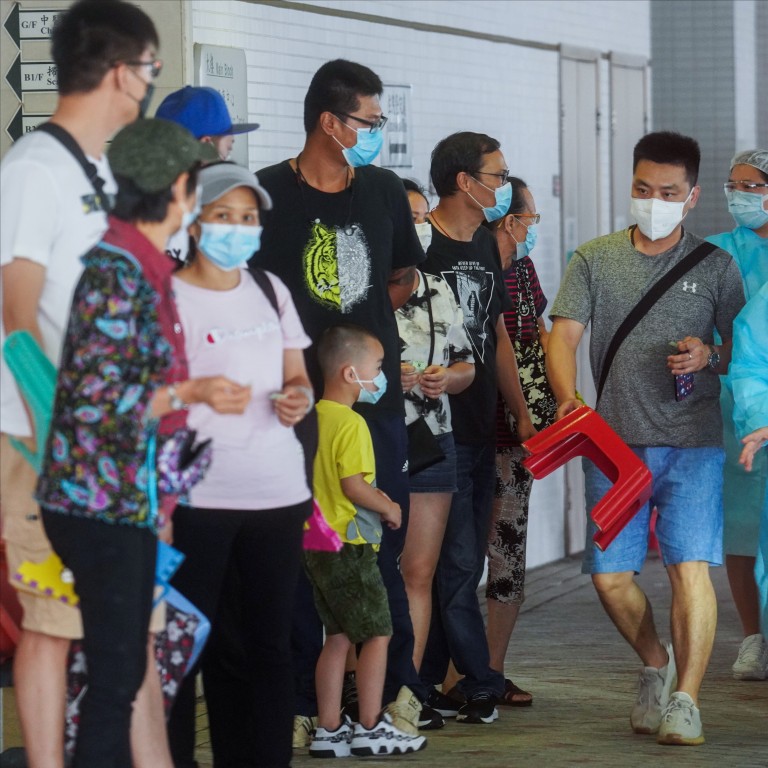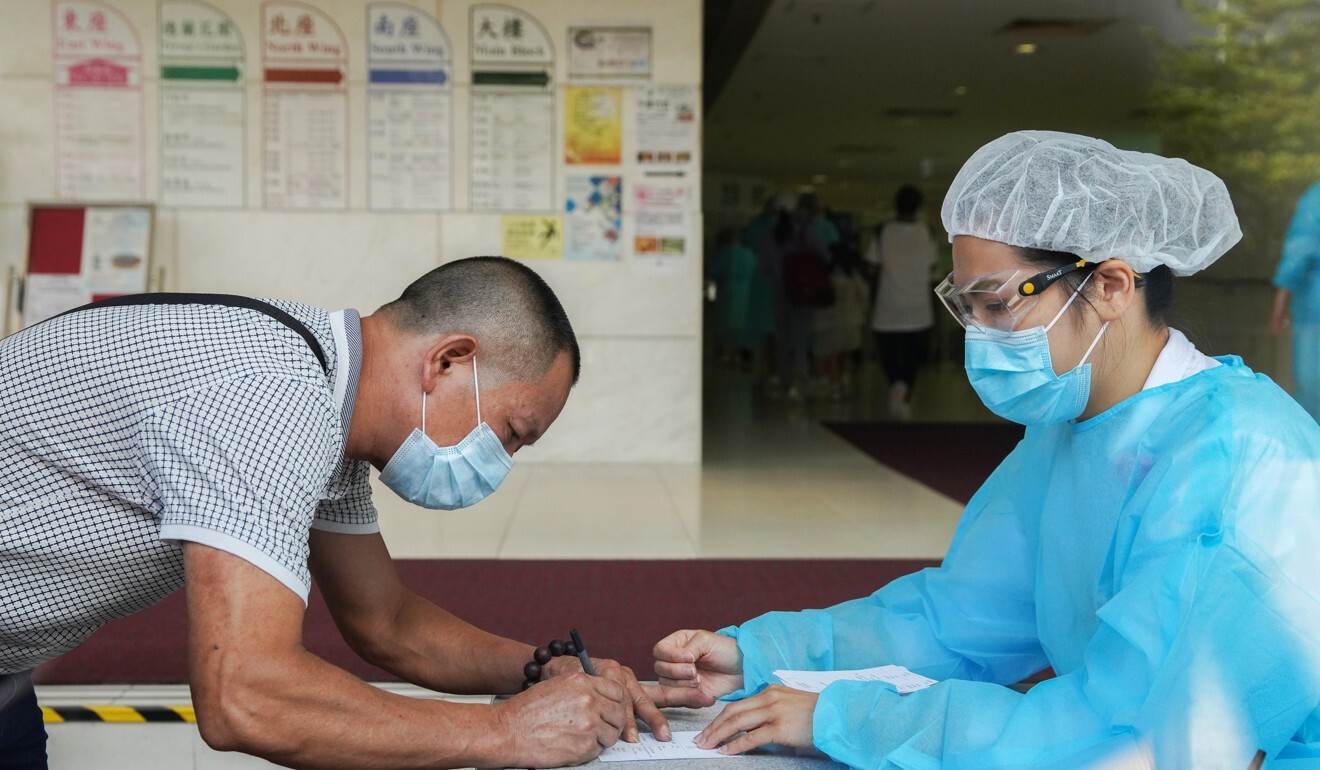
Explainer | Hong Kong third wave: do you really need a Covid-19 test, and what are the steps to take if you do?
- From fears surrounding the surge in infections, to the need for proof of health to cross the border, Hongkongers are queuing for tests despite the advice of experts
- Issues include determining if a test is actually necessary, to finding a hospital that can take samples and get results in a timely manner
The queues are forming despite local health authorities and experts explaining there is no need for testing in the absence of either symptoms or close contact with someone already confirmed to be infected. Heading to the hospital without meeting one of those two criteria is more likely to strain the city’s health care system than provide peace of mind, they say.
With that in mind, here is a short checklist you can go through before making the decision to get tested, as well as avenues for accessing testing services if you feel you need one.

Who is considered a ‘close contact’?
A “close contact” is anyone who has talked to an infected person for at least 15 minutes without wearing masks, from two days before the onset of the patient’s symptoms until the time they have been isolated.
Family members who live in the same household are counted as close contacts as well, according to the Centre for Health Protection, and are required to quarantine.
If an infected person is known to have taken public transport such as planes, buses or trains, anyone sitting two rows in front of or behind the confirmed case would be classified as a close contact.
What if I’m not certain I qualify as a close contact?
It is understandable some people will want to be tested simply because they are not positive about whether they have been the close contact of a confirmed case. Here are a few hypothetical scenarios you could consider, with advice from infectious disease specialist Dr Joseph Tsang Kay-yan:
a) Wet market
I put on a mask and went grocery shopping at a wet market near my home. I stayed at a stall for one or two minutes and bought some vegetables. Later, the stall owner was identified as a confirmed case.
Tsang’s comments:
The risk is relatively low. As long as you did not stay at the stall for long, sanitised your hands thoroughly, and did not touch your face after unpacking the plastic bags and getting your change, you should be relatively safe.
b) In the office
I wear a mask all the time, and only take it off at intervals when there’s no one around. I spend most of the day in the office and eat lunch in the pantry. Recently, a colleague sitting close to me got infected.
Tsang’s comments:
It might be better to go for a test if you have been staying in the same indoor area with an infected person, especially if you had not put on a mask tightly during the period, as some of the droplets containing the virus could remain in the air for three or four hours if the person sneezed or coughed.
Hong Kong third wave: how did city’s scariest surge in Covid-19 cases start, and what did authorities miss?
c) In public or private housing estates
Recently, a neighbour living 10 floors above me became a confirmed case. I do not know him personally and am not sure if I have seen him before.
Tsang’s comments:
I would suggest that those who live on the same floor with the confirmed patient do a test, as you may share some of the public facilities with the person. But for others, your risk is low if you maintain hygiene and seldom leave home.
d) Restaurants
I ate at a restaurant recently and later saw a confirmed case had visited there.
Tsang’s comments:
Try to get more information from the restaurant or health authorities as to which day the confirmed case paid a visit, and where exactly that person sat. If it’s the same period of time and you were sitting close, then you may consider doing a test.
If you are still unsure what to do but feel healthy and do not have symptoms, you may not need to rush in for testing, as the capacity at both public and private sector facilities is quite full.

What are the available options if I need to get tested?
Both public and private clinics and hospitals offer tests, but tests carried out in the public sector will not carry a health certificate declaring you free of Covid-19.
Members of the public can go to any of the 64 general clinics and 17 emergency departments administered by the Hospital Authority for testing if they have a fever, respiratory symptoms or chest infection. After a clinical assessment, they will determine if there is a need to collect deep throat saliva samples either at home or in hospital.
Hong Kong Hospital Authority list of outpatient clinics
If the test result is negative, the authority will inform the patient via text message, while the Centre for Health Protection will contact the patient regarding hospital admission for isolation and follow-up treatment if the test result is positive.
The public can also reach out to eight private hospitals and seven laboratories for tests if necessary, with costs ranging from a few hundred dollars to HK$2,000, and a waiting period of two hours to two days for results.
List of laboratories recognised by the Hong Kong government for testing
Why are people still queuing for tests when health authorities have urged them not to?
But another potential reason is the new mainland policy requiring people who enter Guangdong province from Hong Kong, via Shenzhen Bay Port or the Hong Kong-Zhuhai-Macau Bridge, to present proof of a valid, negative Covid-19 test on arrival.
The certificate, required by mainland authorities since last Friday, must be obtained from one of 15 officially recognised Hong Kong testing institutions, which include some private hospitals and diagnostic laboratories. A negative test result is only considered valid for 72 hours from the time the samples were collected.
No symptoms or link to confirmed Covid-19 case? Getting tested will only overburden system, health official says
Most of these private hospitals, which can carry out anywhere from a few dozen to a few hundred tests each day, were operating at capacity recently.
For example, the booking system at Hong Kong Sanatorium & Hospital, which charges HK$1,800 per test, showed they had no openings for testing until July 25. At Hong Kong Adventist Hospital, the next available testing date was August 5.
Canossa Hospital and Gleneagles Hospital only allow one-day booking in advance, and both hospitals’ websites said they were full when the Post checked on Tuesday. Hong Kong Baptist Hospital‘s site, meanwhile, had announced a “temporary suspension” of testing services.
It is also possible to queue at St Teresa Hospital in Kowloon City, but on Tuesday, the daily 50-person quota was filled before 7am.
How large is the city’s testing capacity?
Local health authorities carried out 94,822 tests in the first half of this month, or 6,773 per day. But the capacity increased to 10,000 people a day in the past week, according to city leader Carrie Lam Cheng Yuet-ngor. The jump in capacity is due to a collaboration with five private laboratories in town that are now assisting the Department of Health by carrying out 1,000 to 2,000 tests per day.
As it moves to increase testing for high-risk groups including elderly and disability care home staff, taxi drivers, and staff in the restaurant and property management, the government has looked to the private sector – and beyond the city’s borders.
Coronavirus: Hong Kong start-up joins government’s mass community testing efforts to contain third wave
Three companies, including two with mainland ties – Shenzhen-based Sunrise Diagnostic Centre Limited is one – have been tapped to assist the government at a cost of HK$300 per sample.
The government’s decision to purchase testing services from the private sector using money from its anti-epidemic fund has sparked controversy and worries about potential leaks of private data. But the government has argued “there is an urgent need to carry out large-scale testing in the shortest time” possible and said contractors are required to comply with data protection rules.
Former Hospital Authority chairman Anthony Wu Ting-yuk, who is also chairman of the Sunrise Diagnostic Centre, has said none of the testing information will be transferred to a third party and that only positive test samples will be referred to the Centre for Health Protection.

